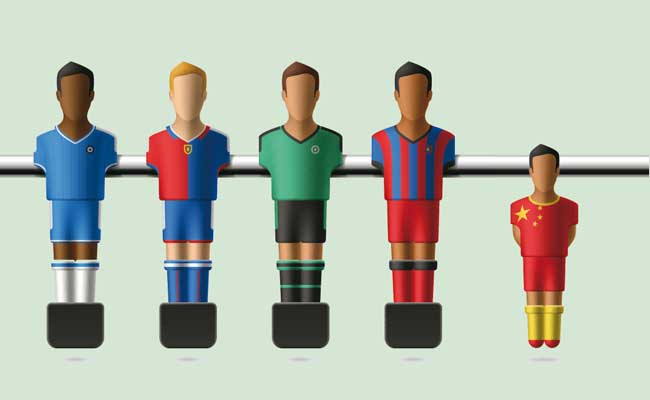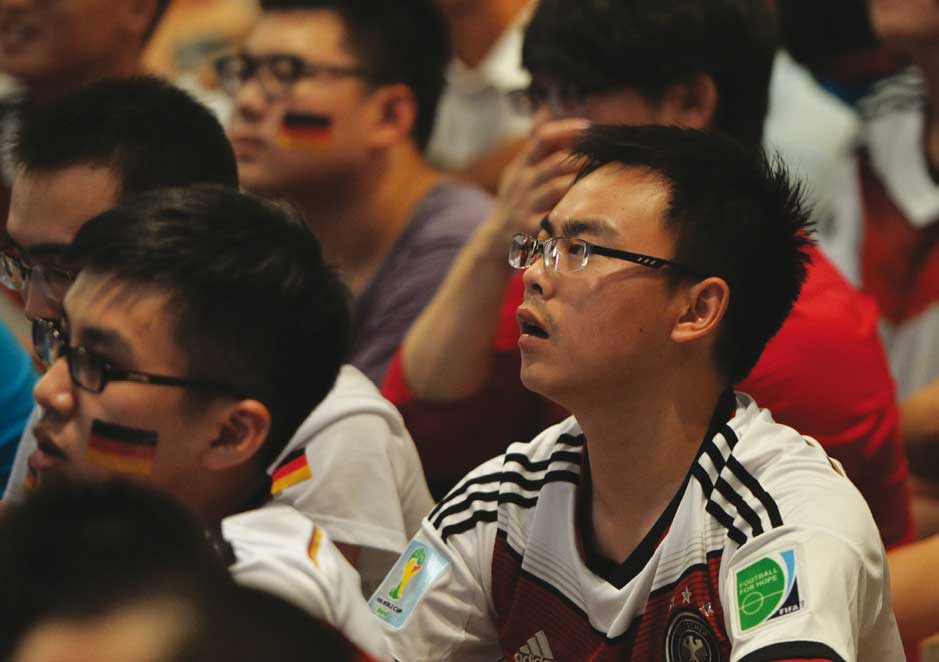
People are taking to soccer in China, but is it just a passing fad or a phenomena that’s here to stay?
Itʼs 4.30am on a July weekday morning at Foreigner Street, a bar district in the upscale Hongqiao suburb of Shanghai, and more than 100 Chinese football fans have stayed up to watch a FIFA World Cup soccer match. Sitting in a tent that slowly gives in to the baking effects of the morning sun, the fans cheer loudly as the goals fly in. But swathes of red with sprinklings of yellow stars, indeed the colors of China, were nowhere to be found—instead the venue was enveloped in the red, black and yellow of the German national team and a handful of Brazilʼs yellow jerseys. The crowd resounded chants of “Deguo!”, the Chinese word for Germany. By the end of the night the Germany fans were posing for pictures in front of the giant screen, timing the snaps to ensure they captured the faces of their soccer idols displayed behind.
It would be an unthinkable scene by the standards of any country with a half-decent soccer team, but in China it has somehow become the norm. This was underscored by the mortifying defeat of the Chinese national team at the hands of Thailandʼs under-23 squad a year ago. But in fact this earlier defeat was only a symptom of problems that had been festering for much longer. Since China failed to score a single goal at its erstwhile World Cup appearance in 2002, the national squad has become something of a national joke.
Fickle Fans
Jack Hu, cheering on his local team at a recent Shanghai Shenhua vs. Beijing Guoʼan match, says he would never support the national team—even if they made it to the World Cup. “I hate Chinaʼs soccer system,” says Hu, who favors Spain. “I only support Shanghai Shenhua.” His friend, who preferred not to be named, explains that the national team was too politicized, detracting from the purity of the game.
Some fans, who would otherwise support the team, cite more banal issues, such as a lack of funding. “Itʼs a systemic problem. Many [local sports] clubs donʼt have money,” says Kevin, 30, a manager at US-based fashion retailer Forever 21 in Shanghai. It is difficult to sustain local soccer programs in cities where land is at a premium and the average consumer is hesitant to shell out several hundred renminbi a pop for tickets.
Others blame social expectations. Daniel Xu, 26, who works in insurance operations, says that because parents expect kids to spend all their time studying, “they donʼt have any time to enjoy soccer and that kind of thing. So academic pressure is a big problem.”
Itʼs not a secret, either, that Chinese soccer has acquired a reputation for corruption. In 2012 the marketing director of Nike China allegedly bribed Chinese Football Association head Xie Yalong in order to secure a sponsorship deal. Even worse, accusations of match-fixing have shaken fansʼ faith in the integrity of the games themselves.
Still, itʼs unclear whether cleaning up the game would make a difference to fans who, unlike many European soccer buffs, arenʼt bound by home country loyalty. Instead, they choose teams with a proven track record—teams that will make them look good by association. “Their point of engagement is not socio-cultural identity necessarily. Their point of engagement is success, itʼs conspicuous consumption. Itʼs choosing a team that is doing well, which confers a particular status upon them,” says Simon Chadwick, Chair in Sport Business Strategy and Marketing at Coventry University Business School and long time researcher of soccer in China.

Training Up
Slowly but surely, things are starting to change. Like many Chinese citizens, the Chinese government also sees the soccer program as something of an embarrassment—an economic superpower that canʼt even best a bunch of Thai teenagers. Chinese leagues have spent millions of dollars putting band-aids on the problem. They have brought in star international coaches like the legendary Serbian Bora Milutinovic and former Spanish national team coach Jose Antonio Camacho, and regularly recruit foreign players, though at times unsuccessfully as was the case with Shanghai Shenhuaʼs failed experiment with star Ivory Coast striker Didier Drogba, who left the team after half a season.
But a major barrier to World Cup glory is the lack of a domestic soccer culture to get kids on the field early. What most people donʼt understand is that star soccer players need to begin technical training before the age of six, says Tom Byer, Head Technical Director for the Chinese School Football Program. “Believe it or not, even a lot of governments and educators donʼt really understand how you actually develop players,” he says. “They think itʼs about the professional league—put more money into that, bring foreign coaches to coach the players.” But the country isnʼt going to get ahead internationally “unless you really put a major investment into the younger kids,” he warns.
The Chinese School Football Program, a government-sponsored grassroots soccer education program launched in 2009, is targeting that pipeline. So are a number of private programs like the Evergrande Academy in Guangzhou. At Evergrande, aspiring soccer players train in both sports and academics, assuaging parentsʼ fears that the game will prove distracting.
The academy is the brainchild of Xu Jiayin, a property tycoon who bought Guangzhou Evergrande in 2010—and some say this strange marriage of real estate and sport could represent a new model for Chinese soccer. Evergrande was just another struggling local football club when Xu Jiayin took the reins in 2010; by 2013 it had rocketed to the top of the Asian Champions League. Most recently Jack Ma, CEO of e-commerce giant Alibaba, announced he was jumping on the bandwagon with plans to buy a 50% stake in the Guangzhou team.
In a country where soccer clubs have struggled to find a viable ownership structure, some see these property and tech moguls as providing just the right mix of capital and entrepreneurial spark. “Obviously China has a history of politicized soccer, whereas now potentially the country is on the cusp of commercialized soccer. So in one sense this really is a difficult situation for them, but in another sense… itʼs an amazing opportunity,” says Chadwick.
Still, strong club teams donʼt necessarily equate with a winning national team, and it will take one or two generations to create a system capable of sustainably producing domestic talent. That means many soccer fans wonʼt be stocking up on national team jerseys just yet. But as China sets out on the long road to the top, there are at least a few loyal followers who will be there every step of the way. When asked if he would support China if the nation managed to field a World Cup team, Kevin adds, without hesitation, “Of course. Iʼm Chinese!”



















